Kurt and Wyatt Russell Open Up About Life, Family, and Godzilla
- Oops!Something went wrong.Please try again later.
- Oops!Something went wrong.Please try again later.
- Oops!Something went wrong.Please try again later.
- Oops!Something went wrong.Please try again later.
- Oops!Something went wrong.Please try again later.
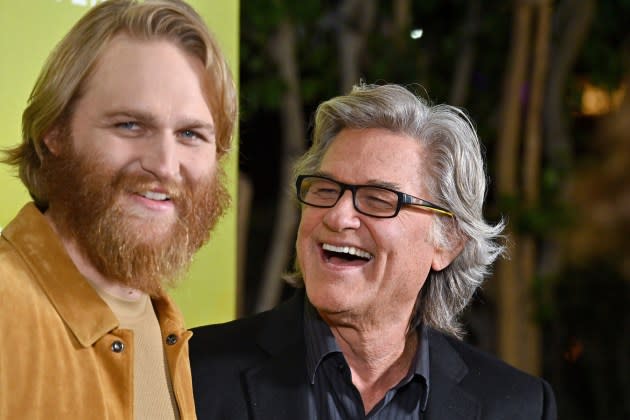
Strong jaw. Flowing hair. Megawatt smile. Effortless charisma. It’s not very difficult to see the resemblance between Kurt Russell and his son Wyatt.
Kurt, 72, got his start as a child actor on TV before becoming one of Disney’s biggest contract stars in his teens — and a personal favorite of Walt Disney’s, who viewed him as “the son he never had” — a pro baseball prospect in the Seventies, an Eighties cult film icon with Escape from New York and The Thing, and then a bona fide Hollywood movie star in Nineties flicks like Tombstone and Stargate. Wyatt, 37, the son of Kurt and Goldie Hawn, was a gifted hockey goalie who played for a number of pro teams before an injury sidelined him and he turned to acting, first popping up in comedies like This Is 40 and 22 Jump Street only to then steal a number of scenes in Richard Linklater’s Everybody Wants Some!! and topline TV shows like Lodge 49 and the Nazi-hunting actioner Overlord.
More from Rolling Stone
And they’ve never appeared together in the same project — that is, until Monarch: Legacy of Monsters, a winning monster series on Apple TV+ that sees the father-son duo portray older and younger versions of Lee Shaw, an Army colonel who crosses paths with Godzilla (and a number of other giant creatures) in the past and present as well as Monarch, a top-secret government organization tracking monsters, aka Titans.
Rolling Stone spoke with a very game Kurt and Wyatt Russell about everything from their parallel journeys and standout projects to the never-ending “nepo baby” discourse.
How’s it been doing a father-son press tour together? And over the holidays, no less?
Wyatt: It’s been really fun, honestly. A lot better than doing it alone, for sure. It’s the most time we’ve spent with each other doing anything since I was probably 13 playing hockey. I had the luxury of being young and my parents being around a lot. In the days of moviemaking in the Nineties and 2000s, a lot of it was in L.A., so they got to be home, which was awesome. My dad never really missed a hockey game and rarely missed taking me to practice. My mom was always at games. And sometimes they made sacrifices to make that happen by not taking jobs and stuff.
Kurt: It’s easier to talk about it because the two of us can kick each other off on thoughts and memories, but it’s true: it’s the first time we’ve had the opportunity to be able to do this, and I gotta tell ya, it’s a lot of fun. And it was great fun for us when he was younger, because he was good and generally playing on good teams, so we spent a lot of time with the families of those teams, and it was great entertainment. It was something Wyatt was very serious about.
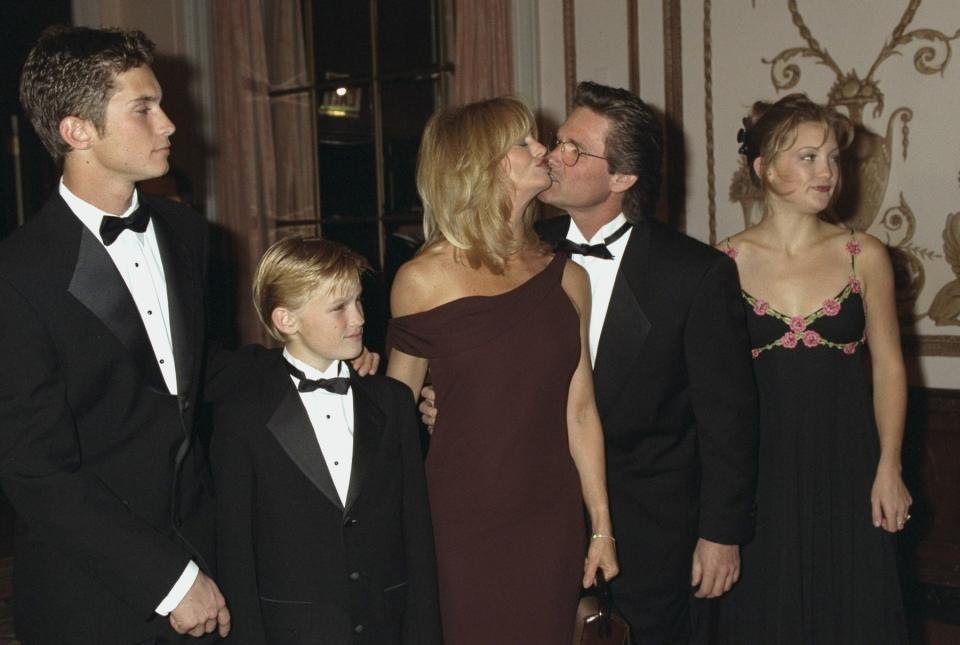
Wyatt, did Goldie make a lot of noise in the stands when she watched you play hockey? I played basketball and could always hear my mom’s voice pierce through the crowd.
Wyatt: My mom had a very distinct, “Woo!” But my dad you could hear a lot. And one of the things my dad wanted to do — I was 13, and he was like, “You know what we should do?” And I was like, “What?” And he was like, “Why don’t they have radios in your helmet, and I can be like, ‘There’s a guy backdoor!’” I was like, “Yeah…” [Laughs]
Kurt, could you talk about you and Goldie being present in your children’s lives when they were younger? I feel like that’s a rarity in Hollywood where you’re forced to go away a lot.
Kurt: Wyatt grew up pretty much the same way I did. I was a baseball player, and my dad was a baseball player, so the motion-picture world was a place to have fun, make some money, and see what happens, but the other place was where we were focused. We just seemed to be more interested in the life that was going on at our home than the life that was going on at work. Work was work, and you did it so you could have a good time at home with your family. Ninety percent of the time, Goldie and I didn’t work at the same time. So, if Goldie was working, I’d just sit at home. We have four kids that grew up, and they were individual, they were all interested in something, and they were all looking to live life their own way.
I gotta ask: Who has the better head of hair?
Kurt: Kurt Russell.
Wyatt: I have feathery-thin hair. There are some good days, but every time I’m on a movie set if I don’t paste my hair to the back of my head inevitably it’s like, “Hold for hair!” He has this thick hair that never moves.
Do you have favorite film or TV projects the other did?
Kurt: I really liked Overlord. And Lodge 49 — I’m a 49er for sure and would love to see more of that. I love Under the Banner of Heaven and what he did with that character. He’s got a wide range of characters and it’s fun watching it.
Wyatt: I love Used Cars, for sure. Used Cars is one of my favorite movies. My dad and mom were always in great movies, so the movies were fun to watch. It wasn’t like, “Oh, there’s my dad in this movie and I guess my dad’s cool, but the movie sucks.” The humor in that movie tickles my funny bone. He’s been in so many good movies. Tombstone is great.
Wyatt, Overboard was technically your film debut as a baby on the golf course. Can you watch that movie or is it like watching an old home video?
Wyatt: No, totally. There was a period when I was living in Canada where it legitimately played on TBS every day. And it’s a great movie! I’ll always watch a piece of it if it’s on. It catches you, and then you watch more than the five minutes you thought you’d watch. I’ll always watch it if it’s on.
Not to embarrass Wyatt, but Kurt, we chatted some years back for Bone Tomahawk and you’d mentioned that Overboard came on cable one night and it… rekindled some romantic feelings between you and Goldie.
Kurt: No, we were in the throes of having some possible romantic things take over and then suddenly we heard the music come on. And we’d never seen Overboard from the beginning since we did it, and it was the very start of it, and we kept watching and watching it and then looked at each other and were like, “This is a funny movie.” I think it’s one of Goldie’s great performance playing both those characters. She was such a blast to watch.
I’m sure you’ve been offered your fair share of father-son roles, so what attracted you both to playing the same Army colonel Lee Shaw in Monarch: Legacy of Monsters?
Wyatt: It was a challenge in a different way. We’d been offered lots of father-son things, but nothing felt right or original. It was like, “A father-son con team trying to find diamonds and the son kills the father at the end of the movie!”
You were offered a lot of movies where you had to kill Kurt?
Kurt: They were trying to tell you something! [Laughs]
Wyatt: [Laughs] And you know, it was not something that was that interesting — and it was before I’d really done enough to carve out my own career, so it really felt like a gimmick. I was like, “You guys don’t really know if I’m a good actor because I’ve only done seven or eight things.” I always felt like I needed to carve out my own little lane. And now, looking back on things I realize that I couldn’t have done this if I hadn’t have done Overlord, or Lodge 49, or Black Mirror, or Under the Banner of Heaven. It came at a time when I went, “No, I can do this and it’ll be my own way and not this gimmicky idea.” This needed work and we needed to work together. We sat down before and said, “Let’s make this character really great and what we’re good at doing,” and talked to the writers who were great at implementing those ideas.
Kurt: People are gonna go into it thinking, “OK… Wyatt and Kurt in a Godzilla movie…” And we knew that they were trying not to do something that was in that world but something where the characters were driving the story. Our hope was that we could give the monsters more impact by people coming into a story and saying, “I relate to that.”
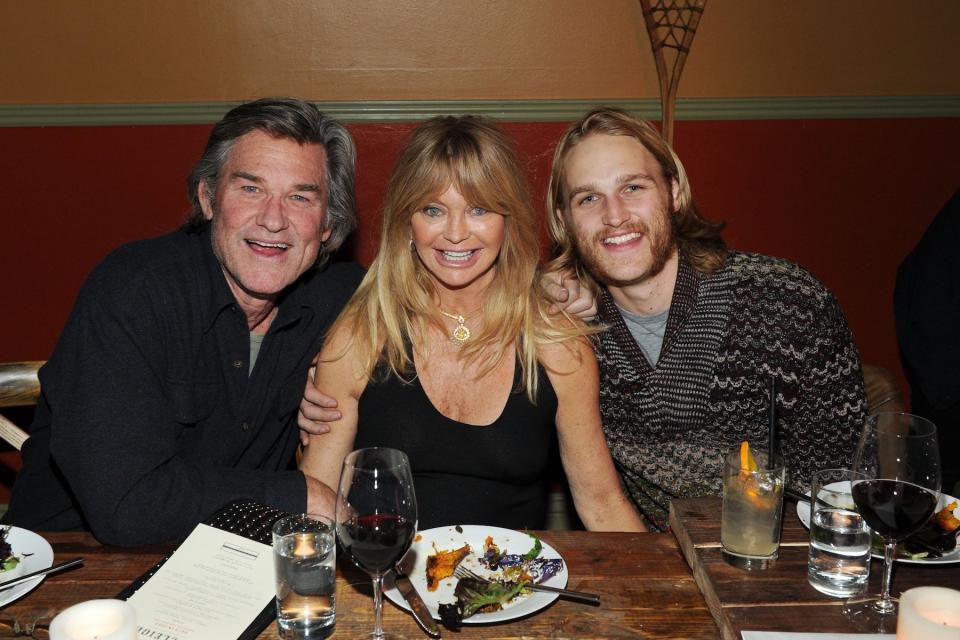
You each had fathers in Hollywood, so I’m curious how you both managed to carve out your own lanes, as you put it Wyatt? Because you both also resisted the Hollywood call and wanted to play pro sports too.
Kurt: Mine’s less interesting. I was so young that none of those thoughts were even in my head. My dad [Bing Russell] did it and looked like he had a good time doing it. And listen: One day of work you could buy two bicycles and it would take me nine months to do it with a paper route. I was like, “Yeah, I’m gonna do that.” And it didn’t get in the way of baseball. I just did what my dad did. He was a ballplayer who then went into acting. I was an actor but was also gearing up for a professional [baseball] career, had it, got hurt, and it was probably a blessing in disguise.
Wyatt: I had quite a bit of reluctance because everyone was like, “Why don’t you just be an actor?” And I was like, “I’m not. I’m a hockey player. That’s what I’m doing.” In my younger-person head, I thought that’s how I would become my own person, and it was true. What I liked about hockey, and specifically goaltending, is that your numbers are your numbers, your wins and losses are your wins and losses, and you can’t hide behind that. People would go, “Oh, this guy is a circus act from California.” Then it was, “Oh, he’s actually pretty good.” Then, we came second in nationals and it was impossible to deny that it was something you were good at and worked hard at.
In film, if I had just gone into that, I don’t know how you get out of that in your own head. Because yeah, there is a leg up when you’re the son of actors. There just is. Agents are gonna want to take a meeting with you because you’re a good, hedged bet. That’s gonna happen. And there’s a bigger microscope on you, but all you have to do is come, perform, and be yourself. I learned how to be myself when I was playing hockey, so after I played hockey it was easier to be myself because I was like, “Well, if this doesn’t work my way, it’s not gonna work at all.” I have a wife [Meredith Hagner] where it wasn’t like that at all. Nobody in her family was an actor and she’s become a super successful actress completely on her own. I’m married to a person who, when she’d heard that they were filming One Tree Hill in North Carolina, drove six hours, printed out a resume, and stood outside the caution tape to get an extra part instead of just getting an audition, and she’s made a career for herself. It’s a very different path, no doubt, and a lot harder, no doubt. You realize the opportunity you have. And I always thought I could be pretty good at it, so why not?
I remember that I grew up seeing cameras everywhere, being on the lot. None of those things bothered me and it felt like home. It was second nature and all very familiar, so when I got in front of the camera, I didn’t have that anxiety. You’re gonna have a leg up in that process. Now, what you do with it from there is up to you.
I do think the whole “nepo baby” cultural conversation is lacking nuance. And I frankly think it’s a much bigger issue in other areas like politics with people like, say, George W. Bush.
Kurt: That goes back to kings and princes, right?
Wyatt: I always put it in this context, for me: When I went to a Washington Capitals rookie camp when I was 17, I was a good goalie. I wasn’t going to get drafted at 17, but it was a good track and I was on the radar. I get invited to this rookie camp and all these great NHL-caliber players were there, and you had all these questions about whether you’re good enough to be there. You have all these self-doubts, like, “Wow, Alexander Ovechkin was drafted here.” There was a guy named Chris Bourque, who was the son of hockey legend Ray Bourque. Chris was about five-foot-eight, strong, unbelievably talented, but I noticed that when Chris walked into the locker room, he owned the locker room — and not in an arrogant way, just in a he’s-grown-up-in-this-locker-room way. He had no fear or self-doubt. Barry Bonds. Ken Griffey Jr. Patrick Mahomes. You can’t make this argument in sports because it’s all numbers-based, and that’s why I liked sports, but with Chris, I remember that I grew up seeing cameras everywhere, being on the lot. None of those things bothered me and it felt like home. It was second nature and all very familiar, so when I got in front of the camera, I didn’t have that anxiety. You’re gonna have a leg up in that process. Now, what you do with it from there is up to you.
Kurt: Whatever it is, you’re gonna have to make your own way, man.
Wyatt, the first time I saw you on screen was in This Is 40. It’s your first role in a big Hollywood movie and you’re playing a hockey player who’s hitting on Leslie Mann, who’s the director’s wife. Was that nerve-racking?
Kurt: [Laughs hysterically]
Wyatt: So nerve-racking! And it was not just any director — it was Judd Apatow. In the audition, I got brought in and it was great because they just wanted me to be a hockey player, so I read the lines, and then they were like, “Just talk about hockey…” And I had to improv, and I’d never improv’d in my life. But it was great because he gave me the freedom to be who I had been for 15 years. I was wondering what the dynamic would be on set with Judd and Leslie and it was work. He was just directing her like a regular actress, so they made me very comfortable. Plus, I was acting with a bunch of other hockey players. I felt more like them than I did an actor.
I really enjoyed Linklater’s Dazed and Confused “spiritual sequel“ Everybody Wants Some!! and was at its SXSW premiere. Do the boys still keep in touch?
Wyatt: There’s a text chain. The “Keys” text chain, every once in a while something will happen, and Forrest [Vickery] is usually the one who will say something first. Austin Amelio kept in touch and we became best friends, but also every once in a while, Glen [Powell] will have his shirt off, and he’s the most jacked guy on planet Earth, and someone will be like, “Damn, he’s sexy!” That was one of the best times in my life. I didn’t want to act anymore, to be honest, and that experience brought me back to it. I owe my life to Rick Linklater, to be honest. He changed everything for me.
Kurt: It’s funny how that can happen, isn’t it? There are times when you think, “I’m done,” but then something comes along. I’ll never forget it, because it was an odd thing. I’d just finished doing Tombstone, which was a rough ride. Really tough. And I had a job immediately after that. So, three weeks later, we were down in Buttercup Valley doing Stargate. It was very different, and we had no idea it was going to be successful. After that I was like, man, maybe I’m done. And I ran into Larry Fishburne, who I didn’t know but is someone I’ve always appreciated. I was like, “I think I’m out, man.” And he was like, “Oh, you can’t do that. You’ve got a lot more to do, and a lot more to give. You can’t talk like that.” He spoke with this sense of honesty, and it was just from one actor to another, and it was a strange thing. He probably doesn’t know how influential he was in me continuing on. I always appreciated it and remember it from time to time.
Speaking of Tombstone, I had heard that you essentially directed that movie.
Kurt: Tombstone will always remain a mystery. I made a promise to somebody that I won’t talk about things publicly. At the end of the day, I’m really glad that it came out as well as it did. It had a group of fantastic actors and a writer that, in my opinion, wrote the best Western dialogue ever. And I always see it climbing its way up the ranks in the “Best Western” conversation. I will say this: If I had not been around, Tombstone wouldn’t have, either.
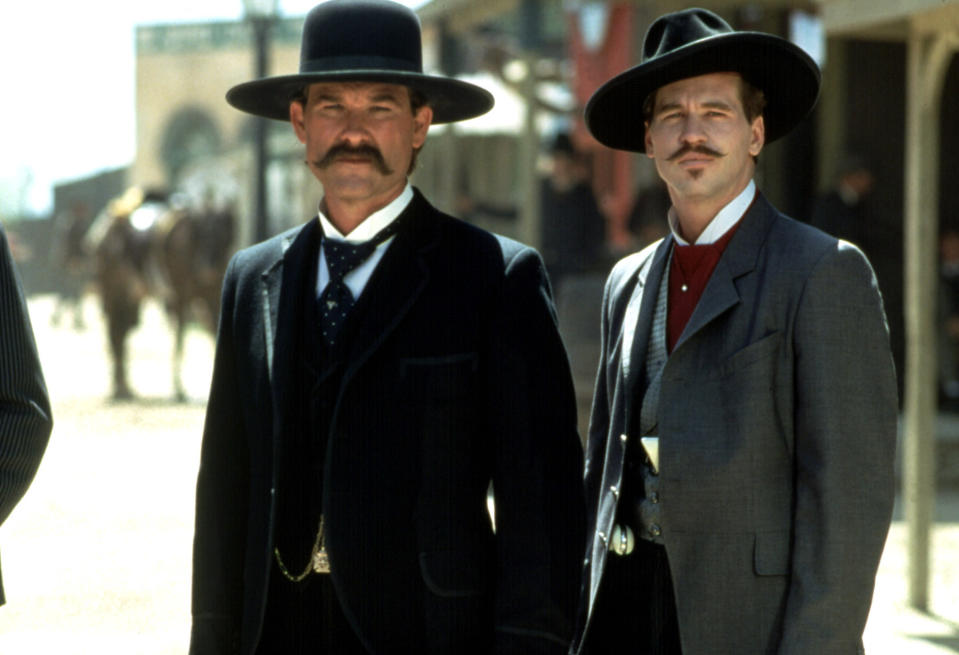
Your Wyatt Earp and Val Kilmer’s Doc Holliday had such incredible chemistry in that. You really felt like it was this decades-old friendship.
Kurt: There’s this great expositional line when we first run back into each other. Virgil shakes hands with him and then says, “These two know each other so well they don’t even shake hands.” And that became an interesting reality with my relationship with Val. We just had a connection. We still do. I don’t see Val as much as I like to. What’s important to remember about Val right now is that he’s still physically different, but his head is exactly the same. It’s still Val. And I’ve always had a tremendous appreciation for his sense of humor and his brain. We really hit it off. And it wasn’t simple, and at times complicated, but I love the guy, what can you say? There’s a connection that we had and a lot of it is on film there.
It was in a situation, too, where I had to forfeit a lot of the reason why I wanted to do the movie, but in so doing was able to say to Val, “Hey, man: Your performance here is going to really, really matter. My character is going to be much more of an aura character now — because of the situation we’re in.” But wow, what a cast. And the writing that Kevin Jarre did.
Wyatt, one of my favorite films of yours is Ingrid Goes West. And I think it gets even better with each passing year. Few films have better captured influencer culture, social media addiction, and the people of Venice, California.
Wyatt: Yes. I couldn’t agree more. Matt Spicer, who wrote and directed that movie, really understood what he wanted to make a movie about. Aubrey Plaza in that movie is so good, and I always felt like she was underrated for that movie. That was the first time that I was like, “Damn… Aubrey Plaza is really fucking good.” It was an incredible performance from her. And Lizzie Olsen, who played my wife, the dynamic between those two characters was done so well. You knew what the public perception was of this person, but what are they really like? The humor with the reality and sadness of what the reality is was really well done. It was a difficult movie for Matt to do because there was a bit of life imitating art. Not with Matt, but there were people on set who you were almost making the movie about, and I was like, “Do these people fucking know that they’re making a movie about themselves?” But in a way, that added to the whole experience.
Kurt: More people talk to me about that movie — and I haven’t seen it, but I really want to — of the ones you’ve done more than any other movie. They go, “I really like that.”
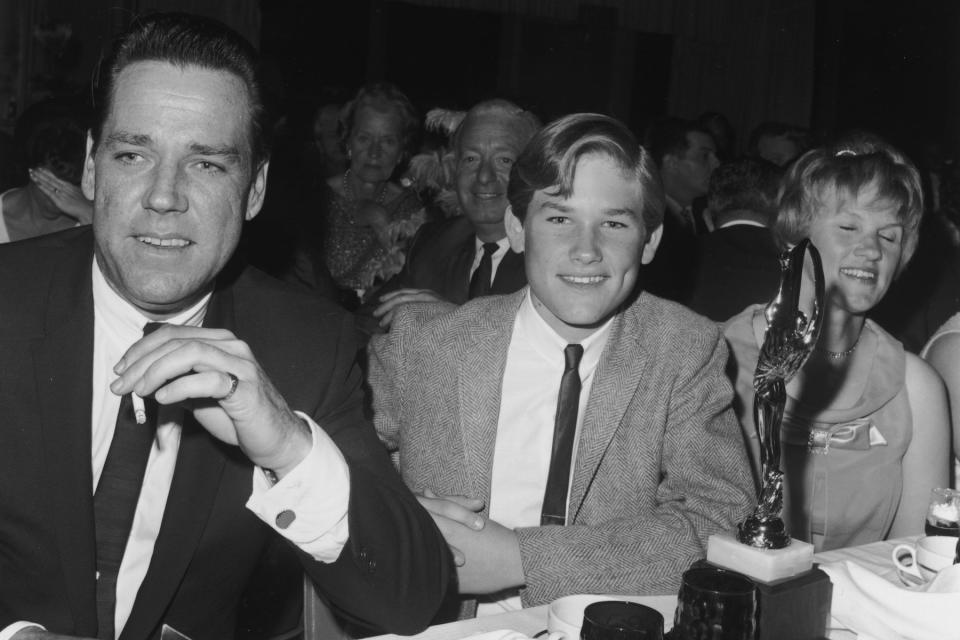
Kurt, this is a part of cultural lore: That the last words Walt Disney ever wrote on a piece of paper was your name: “Kurt Russell.”
Kurt: It was written. They called me into [his] office and said, “We’re leaving it as it was, but this was the last thing he wrote. Do you know what this is about?” And I said I didn’t. I’d heard some interesting things lately from people who’ve studied it and they said that because of the way he was, and because of the way my grandfather was, I knew him. Some people said, “You’re the son he never had.” And I think back on some of our time together, and I don’t know if that statement is anywhere near true, but if I look at those times, he treated me like one. And I probably learned more from him than anyone in my life in this business. He took me to all the department heads and showed me what was going on. He knew I was a ballplayer and then when I was around 14, 15 he died.
He reminded me of my grandfather a lot. I was always impressed with the way people responded to him when he came down to the set. He was not an intimidating man to me, and always straightforward. We played ping-pong together. At lunchtime, he’d call me in, and we’d have lunch together on this little table and talk about things. This was 1964, ’65, ’66. There was Disneyland but no Disney World yet. I was in his office one time and he was looking at this dome thing and said, “What do you think of that?” And I said, “That’s really cool!” And it said “Epcot” on it. And we went up to his office and he had a model there of a world inside of a dome. I had a lot of truly unique experiences with him that, as I’ve aged, I’ve come to appreciate more and more.
He told me something that I’ll never forget about character arc. He said, “Character arcs are something you’re going to hear a lot about. Be careful of that. A character arc is something that I think people get incorrect.” And I said, “What do you mean?” And he said, “The best character arcs have characters who fight that arc. Characters who follow an arc? That doesn’t work as an actor. You have to fight that arc.” Years later, I deduced what he was trying to show me.
Best of Rolling Stone

